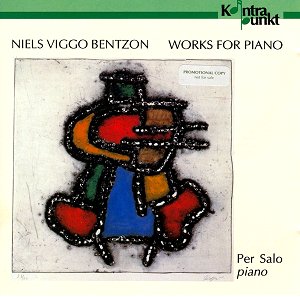Bentzon's colossal output is bewilderingly extensive.
Per Salo and Kontrapunkt give us an opportunity to reflect on
a sampling from the solo piano works. In listening we would do
well to remember that Bentzon, the pianist composer, invested
a great deal of his creative self in his music for the instrument.
The Partita is an early work written during a tragic
and pregnant year in history and encompasses a wide range from
the disturbingly clamorous Allegro to the Debussian Intermezzo.
No wonder that this was the key to Bentzon's first real recognition.
This is succeeded by the patteringly splenetic second intermezzo
before a hyper-Handelian striding fanfare. The writing
has the clarity of Hindemith but is anarchically restive in a
way typical of the composer. Fifteen years later and the composer
wrote the four movement Seventh Sonata in a different language
which flirts with Schoenbergian dodecaphony (he wrote a book on
Schoenberg's twelve-tone music) amid the cerements of romantic
protest and the striking of nineteenth century gestures. There
were moments when this work had me thinking of Howard Ferguson's
Lisztian Piano Sonata. There are eleven Woodcuts.
They are closer to the Hindemith pole than to Schoenberg. These
miniatures embrace Haydnesque speed, minatory dissonance and Bachian
splendour. They could easily have occupied a place in the massive
Det Tempererede Klaver sequence recorded by ClassicO and
reviewed here. The threatening lullaby of the single movement
Hoffmann Sonata is simple yet tender and extremely
affecting having the atmosphere of Martinů's
Lidice Memorial. From this grows a whirlpool of
activity and Lisztian fury (9.37) which when it has subsided leaves
us in a still and deeply affecting Debussian pool in which bells
toll de profundis.
It is a pity that indexing rather than tracking
has been used to separate sections inside each of the four pieces.
How many machines these days can access indexing? Certainly mine
cannot.
The compact notes are by Anders Beyer and although
they mention the Partita and Woodcuts there is no
reference to the two sonatas.
Rob Barnett
see
also article by Rob Barnett
